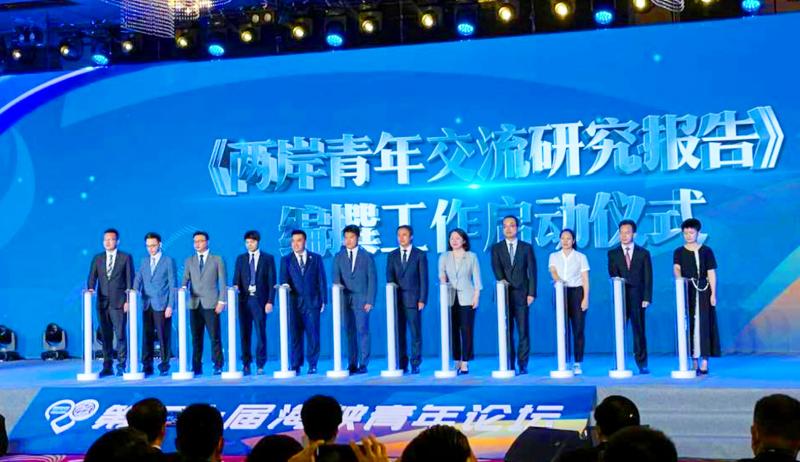Bejing’s promotion of cross-strait exchanges is nothing but propaganda and an attempt to poach Taiwanese talent, the Mainland Affairs Council (MAC) said yesterday after Chinese President Xi Jinping (習近平) urged young Taiwanese to support unification.
“I am glad to learn that young people from Taiwan have witnessed the rapid developments and changes of the motherland, and felt the warm feelings between compatriots from both sides of the Taiwan Strait who are all of the same family,” Xi told the Straits Youth Forum in Xiamen earlier yesterday.
The coorganizers of this year’s forum — the 20th iteration of the event — included the Chinese Communist Party’s All-China Youth Federation and the Chinese Nationalist Party’s (KMT) Department of Youth Affairs.

Photo: CNA
Young Taiwanese should join hands with their Chinese counterparts to “strive relentlessly for national rejuvenation,” Xi said.
In response, the MAC said that educational exchanges are part of Beijing’s campaign to gain political influence in Taiwan, but its promises are not made in good faith.
Citing Xi’s comment, the MAC said the Chinese leader pledged to “maintain the excellent conditions of academic exchanges across the Strait as before.”
Xi’s claim was undercut by the Chinese government in April 2020 unilaterally shutting down the path for Chinese students to study in Taiwan, it said.
“It is clear that China’s exchanges and proclamations of mutual benefits for young Taiwanese are nothing but propaganda to poach talent to fill capability gaps in its economy,” the MAC said. “Its claims of mutually beneficial exchanges are insincere.”
Information packets warning Taiwanese of the pitfalls of studying or working in China were published on the council’s Web page ahead of the forum, while domestic groups are urged not to become tools of Beijing, it said.
Democratic Progressive Party Legislator Wang Mei-hui (王美惠) said China is taking advantage of young first-time jobseekers with empty promises of economic opportunities.
Many Taiwanese investors have lost money in the Chinese market due to predatory state-sanctioned business practices, she said, adding that a society devoid of democracy and human rights can offer no advantages.
“Young people should be aware of the true conditions behind the facade in China,” she said. “As for the fatherland, one country on each side has long since been the reality for Taiwan and China.”

‘TAIWAN-FRIENDLY’: The last time the Web site fact sheet removed the lines on the US not supporting Taiwanese independence was during the Biden administration in 2022 The US Department of State has removed a statement on its Web site that it does not support Taiwanese independence, among changes that the Taiwanese government praised yesterday as supporting Taiwan. The Taiwan-US relations fact sheet, produced by the department’s Bureau of East Asian and Pacific Affairs, previously stated that the US opposes “any unilateral changes to the status quo from either side; we do not support Taiwan independence; and we expect cross-strait differences to be resolved by peaceful means.” In the updated version published on Thursday, the line stating that the US does not support Taiwanese independence had been removed. The updated

‘CORRECT IDENTIFICATION’: Beginning in May, Taiwanese married to Japanese can register their home country as Taiwan in their spouse’s family record, ‘Nikkei Asia’ said The government yesterday thanked Japan for revising rules that would allow Taiwanese nationals married to Japanese citizens to list their home country as “Taiwan” in the official family record database. At present, Taiwanese have to select “China.” Minister of Foreign Affairs Lin Chia-lung (林佳龍) said the new rule, set to be implemented in May, would now “correctly” identify Taiwanese in Japan and help protect their rights, the Ministry of Foreign Affairs said in a statement. The statement was released after Nikkei Asia reported the new policy earlier yesterday. The name and nationality of a non-Japanese person marrying a Japanese national is added to the

AT RISK: The council reiterated that people should seriously consider the necessity of visiting China, after Beijing passed 22 guidelines to punish ‘die-hard’ separatists The Mainland Affairs Council (MAC) has since Jan. 1 last year received 65 petitions regarding Taiwanese who were interrogated or detained in China, MAC Minister Chiu Chui-cheng (邱垂正) said yesterday. Fifty-two either went missing or had their personal freedoms restricted, with some put in criminal detention, while 13 were interrogated and temporarily detained, he said in a radio interview. On June 21 last year, China announced 22 guidelines to punish “die-hard Taiwanese independence separatists,” allowing Chinese courts to try people in absentia. The guidelines are uncivilized and inhumane, allowing Beijing to seize assets and issue the death penalty, with no regard for potential

‘UNITED FRONT’ FRONTS: Barring contact with Huaqiao and Jinan universities is needed to stop China targeting Taiwanese students, the education minister said Taiwan has blacklisted two Chinese universities from conducting academic exchange programs in the nation after reports that the institutes are arms of Beijing’s United Front Work Department, Minister of Education Cheng Ying-yao (鄭英耀) said in an exclusive interview with the Chinese-language Liberty Times (the Taipei Times’ sister paper) published yesterday. China’s Huaqiao University in Xiamen and Quanzhou, as well as Jinan University in Guangzhou, which have 600 and 1,500 Taiwanese on their rolls respectively, are under direct control of the Chinese government’s political warfare branch, Cheng said, citing reports by national security officials. A comprehensive ban on Taiwanese institutions collaborating or